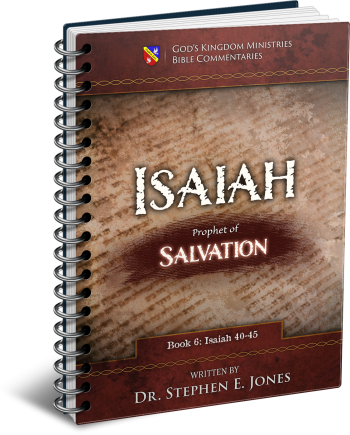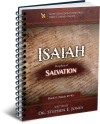Latest Posts
View the latest posts in an easy-to-read list format, with filtering options.

Isaiah is the prophet of Salvation. He is also known as the truly "Universalist" prophet, by which is meant that He makes it clear that salvation is extended equally to all nations and not just to Israel. He lived to see the fall of Israel and the deportation of the Israelites to Assyria, and he prophesied of their "return" to God (through repentance). He is truly a "major prophet" whose prophecies greatly influenced the Apostle Paul in the New Testament.
Category - Bible Commentaries

Isaiah 42:1 says,
1 “Behold, My Servant, whom I uphold, My chosen one in whom My soul delights. I have put My Spirit upon Him; He will bring forth justice to the nations.
Isaiah refers to four individuals as God’s “servant,” along with the nation of Israel itself: David in Isaiah 37:35, Israel in Isaiah 41:8, Cyrus in Isaiah 44:26, and the Messiah in Isaiah 42:1. The term “servant” implies that these serve their Master. In other words, they are messengers of God, speaking precisely what their Master has told them to speak and doing precisely what their Master has told them to do.
Anyone who does this, even in a limited or partial manner, is a type of Messiah, insofar as he fulfills the word of the Lord. Such types and shadows are still imperfect images of Christ—warped to one degree or another—and yet God still recognizes them according to their limited abilities. But there is also the Messiah Himself who does all things perfectly, because Heb. 1:3 says, He is “the exact representation of His nature” (NASB) or “the express image of His Person” (KJV). This One, we know, is Jesus Christ Himself.
Isaiah 42 uses the non-specific term “My Servant” to include (at least in the shadows) all types of Christ, while focusing on the Messiah in particular. In fact, Ferrar Fenton arranged his translation to show that “Ode 9” extends from Isaiah 41:25 to Isaiah 42:5. He believed, then, that on the surface, “My Servant” in Isaiah 42:1 was a direct reference to Cyrus, the “aroused one from the north” (Isaiah 41:25). Fenton arranges Isaiah’s Book 2 into 69 “Odes,” or what others call the “Servant Poems.”
Regardless of the role that Cyrus played in building Jerusalem, Isaiah 42:1 is to be applied directly to the Messiah Himself, as we will see. Isaiah 42:2-4 describes the Messiah and His earthly ministry of building the New Jerusalem, saying,
2 “He will not cry out or raise His voice, nor make His voice heard in the street. 3 A bruised reed He will not break and a dimly burning wick He will not extinguish; He will faithfully bring forth justice. 4 He will not be disheartened or crushed until He has established justice in the earth; and the coastlands will wait expectantly for His law.”
Perhaps King Cyrus of Persia partially fulfilled this description by not walking among the common people or by talking with them “in the street.” The “justice” that he brought forth was specifically in setting the captives free to return to the lands from which they had been exiled. But the Messiah had a much greater ministry that fulfilled this passage, as we see from Matt. 12:15-21,
15 But Jesus, aware of this [i.e., the Pharisees’ plot to kill Him], withdrew from there. Many followed Him, and He healed them all, 16 and warned them not to tell who He was. 17 This was to fulfill what was spoken through Isaiah the prophet: 18 “Behold, My Servant whom I have chosen; My beloved in whom My soul is well-pleased; I will put My Spirit upon Him, and He shall proclaim justice to the Gentiles. 19 He will not quarrel, nor cry out; nor will anyone hear His voice in the streets. 20 A battered reed He will not break off, and a smoldering wick He will not put out, until He leads justice to victory. 21 And in His name the Gentiles will hope.
Matthew was quoting the Septuagint loosely. The Septuagint was the Greek translation of the Hebrew Old Testament that was widely used in the first century. The Septuagint deviates from the Hebrew text in Isaiah 42:1, for it reads,
1 “Jacob is My servant, I will help him; Israel is My chosen, my soul has accepted him; I have put My Spirit upon him. He shall bring forth judgment to the Gentiles.”
This is quite different from the Hebrew text: “Behold, My Servant, whom I uphold.” The Hebrew text does not identify the servant by name, whereas the Greek translation identifies the servant as Jacob-Israel. Matthew disagrees with the Septuagint by retaining the Hebrew text. Obviously, he understood that Isaiah was referring to Jesus Christ, not to Jacob-Israel.
Nonetheless, Matthew retains the phrase, “I have put My Spirit upon him,” but adds, “My Beloved in whom My soul is well-pleased.” Matthew was inspired to add that which was spoken by God at the Mount in Matt. 17:5, when He affirmed Christ, saying, “This is My beloved Son, with whom I am well-pleased; listen to Him!”
Matthew thus makes a correction to the Septuagint text which had misidentified the “servant.” By identifying Christ in this manner in chapter 12, Matthew was foreshadowing the revelation given on the Mount in chapter 17 of his gospel.
The Servant, Isaiah says, “will not cry out or raise His voice.” Matt. 12:19 interprets this, “He will not quarrel, nor cry out.” Matthew was telling us that Jesus “withdrew” because He did not want to “quarrel” with the Pharisees.
As for the Servant’s silence in the street (Isaiah 42:2), Matthew interpreted this in light of Jesus’ warning “not to tell who He was” (Matt. 12:16). The force of this is to say that the true Servant of God would not “blow his own horn,” as we say. He did not seek publicity, nor did He seek to build a following who would force the religious leaders to recognize Him as the Messiah.
Another identifier was that “a bruised reed He will not break” (Isaiah 42:3). This was a metaphorical way of saying that He would not destroy (or bully) those who were weak. Neither would He extinguish “a dimly burning wick;” that is, He would not despise the smallest testimony (light) that a weak believer might have. Instead of saying scornfully, “Your testimony is nothing compared to mine,” Christ was to encourage people and value even the smallest light.
Overall, this description reveals the nature of Christ and, by extension, His heavenly Father.
Finally, “My Servant” was to be diligent and persistent until He accomplished all that He was called to do in the earth. Opposition would not dishearten Him, for He understood the sovereignty of God. His purpose was to “faithfully bring forth justice,” and He will not cease to pursue that goal “until He has established justice in the earth.” In other words, He will succeed. The earth will fulfill its purpose.
The “earth” (eretz) can also refer to “the land” in a restricted sense (as in the land of Israel); but in this case eretz refers to the inhabitable earth. Isaiah says, “the coastlands will wait expectantly for his law” (Isaiah 42:4). The Septuagint says, “in His name shall the Gentiles trust,” showing that the rabbinical translators understood this as referring to non-Israelites.
Matt. 12:21 agrees, saying, “And in His name the Gentiles will hope.”
Hence, this gives the scope of Christ’s ministry. His law will be the standard, not only for the genealogical descendants of Jacob, but also for the whole earth. This was, in fact, prophesied many times by David. Psalm 67:4 says,
4 let the nations be glad and sing for joy, for You will judge the peoples with uprightness and guide the nations on the earth.
By not understanding the law or the role of a godly judge, most people think of “judgment” in negative terms. But justice is precisely what the people desire, because most people live in an unjust system and are ruled by a privileged class. Justice means equal justice, where the law applies to everyone equally and impartially, whether they are great or small, rich or poor. Num. 15:16 says,
16 There is to be one law and one ordinance for you and for the alien who sojourns with you.
Partiality or unequal justice was forbidden in Exodus 23:3, 6, 7 and also in James 2:9,
9 But if you show partiality, you are committing sin and are convicted by the law as transgressors.
It is such justice, defined and mandated by the law of God, which characterizes the Kingdom of God. “My Servant” will diligently pursue His goal until righteousness and justice is fully established in the entire earth. The justice of God is always a burden to the fallen nature of man, but at the same time it brings peace and prosperity to all who live under its jurisdiction. The law protects the rights of the people.
The scope of prophecy tells us that Christ will rule the whole earth, for He is the inheritor of the Birthright. While unenlightened men may fear His law, the day will come when every knee will bow, and then they will understand and rejoice, seeing that “the law of the Lord is perfect, restoring the soul” (Psalm 19:7).
They will see that “the commandment of the Lord is pure, enlightening the eyes” (Psalm 19:8) and that His laws “are more desirable than gold” (Psalm 19:10). In that day, as Psalm 66:4 says,
4 All the earth will worship You and will sing praises to You; they will sing praises to Your name. Selah.